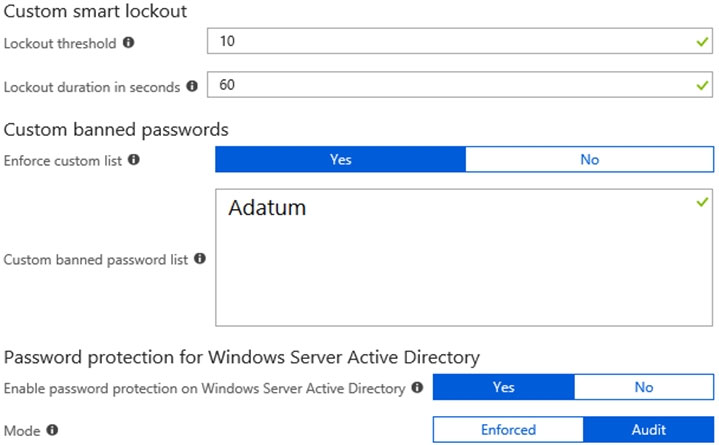

HOTSPOT -
Your network contains an on-premises Active Directory domain named adatum.com that syncs to Azure Active Directory (Azure AD).
The Azure AD tenant contains the users shown in the following table.
You configure the Authentication methods `" Password Protection settings for adatum.com as shown in the following exhibit.
For each of the following statements, select Yes if the statement is true. Otherwise, select No.
NOTE: Each correct selection is worth one point.
Hot Area:

maylevi
Highly Voted 3 years, 7 months agoConanBarb
2 years, 1 month agoConanBarb
2 years, 1 month agoxavi1
3 years, 6 months agoOpsecDude
2 years, 7 months agoJacky_YO
3 years, 1 month agoIvanIco
1 year, 5 months agoFloweezy
Highly Voted 3 years, 5 months agoxRiot007
9 months, 2 weeks agoadamsca
3 years, 4 months agoadamsca
3 years, 4 months agoNaqsh27
3 years, 4 months agodzampar
3 years, 4 months agoPatchfox
3 years, 3 months agoPatchfox
3 years, 3 months agorooban
3 years, 2 months agoNickname01
2 years, 3 months agoMathiasC
1 year, 5 months agoTom_tank
Most Recent 2 months, 3 weeks agoSrirupam
5 months, 2 weeks agopentium75
9 months agoJaridB
1 year agojoegie00698
1 year, 3 months agobrooklyn510
1 year, 3 months ago[Removed]
1 year, 4 months agoflafernan
1 year, 4 months agoPierreTang
1 year, 4 months agoTheProfessor
1 year, 5 months agoalopezme
1 year, 7 months agoIvanIco
1 year, 7 months agoTheProfessor
1 year, 7 months agoMichaelD_NZ
1 year, 8 months agoSelf_Study
1 year, 8 months ago